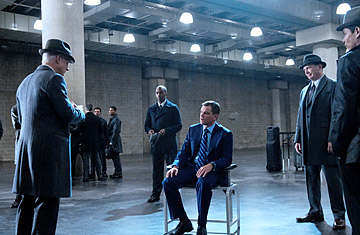
From Left: John Slattery, Anthony Mackie, Matt Damon and Andrew Schwartz in The Adjustment Bureau.
You do — or don't — answer the phone, read an email, go to a party, catch the bus. If any one of these seemingly insignificant events were to go the other way, the story of your life — perhaps the history of the planet — might have a different twist. And what if all random occurrences were actually part of some divine or nefarious plan? That's the premise of Philip K. Dick's 1954 story "Adjustment Team" and of George Nolfi's up-and-down movie version, The Adjustment Bureau, with Matt Damon and Emily Blunt as lovers who fight the system to forge their own destiny together. It's a clever idea that, around the mid-point, stumbles into absurdity as the movie itself makes too many lunatic choices.
David Norris (Damon) is that rare politician, a salt-of-the-earth idealist with tremendous charm and no spouse, cohabitant or apparent sex life. He seems on the verge of winning the New York Senate election when the New York Post runs a photo of David's exposed butt in a mooning escapade from his college days. Alone in a hotel men's room on election night, he is preparing his concession speech when he detects a noise in one of the stalls. It's a woman, Elise Sellas (Blunt), who strikes up a quick friendship, shares a kiss and inspires David to deliver a charismatic public confession that makes him a front-runner in the next Presidential race. Gee, what luck he happened to run into Elise. Or may we call it Elysian design?
She disappears and it is by the merest chance that he sees her on a city bus. Chasing her but not catching up, he's late to work; the place is deserted except for some busy gents in suits. Turns out they're, well, angels — members of the Adjustment Bureau, a sort of seraphic sanitation squad that oversees and controls the meager lives of humans. "We're the people who make sure things happen according to plan," says the chief of this detail, Richardson (Mad Men's John Slattery, treating David with the mandarin contempt that Roger Sterling pours all over poor oily Pete). "You saw behind a curtain you didn't know existed." David promises not to reveal what he saw, until his memory of Elise overcomes his caution. He might be a brother to the Paul Rudd character in James L. Brooks's How Do You Know, who believes that "We are just one small adjustment away from making our lives work." David's adjustment is to buck the Adjustment Bureau and escape with Elise. They might be Orpheus and Eurydice, running for their lives and their destinies through the Underworld, Otherworld or Bizarro World.
The Dick original paints a darker portrait of those watching over us. Ed Fletcher is a realtor, not so happily married to Ruth. Getting to work a little late one morning. finds his office building, and his colleagues inside, petrified in crumbly dust, only the adjustors are at work on Ed's floor. When he returns an hour later to find the building intact and his coworkers as they were — except for certain tiny details. ("They had all been remolded, recast — Endless, subtle changes.") He thinks he's going mad, until he takes a celestial elevator to Adjustment Team and gets the skinny from the Old Man. For the good of the world, the deity says, Ed's boss needed to close a big contract for Canadian forest land; and that required a refitting of the boss. Ed wasn't supposed to see any of this, but one of the adjustors literally fell asleep on the job. Ed swears he'll keep the secret, won't even tell his wife Ruth. To make sure, the team sends one of its staff to "adjust" Ruth — to vacuum her brain.
The notion of one person or one little incident having a seismic ripple effect has filled many college cafeterias with nerdy debates on chance, free will and butterflies. The springboard of It's a Wonderful Life, it also inspired Alan Ayckbourn to write his 1983 play cycle Intimate Exchanges, in which the decision to have or not have a cigarette leads to two, then four, then eight and 16 variant scenes. (Alain Resnais filmed most of the cycle in 1993 as Smoking/No Smoking.) In Dick's lavish imagination, Fate was so complicated a thing to manage that it required a vast bureaucracy, with all the fussiness, interoffice rivalries and occasional screw-ups of any large enterprise employing the kind of Organization Men who wear suits and fedoras to work.
